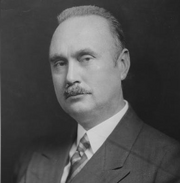
Governor-General Henderson Dewey.
The Seventeenth Grand Council of the Confederation of North America was elected to a five-year term on 16 February 1923. The partisan makeup of the Seventeenth Grand Council was eighty-one Liberal Party and sixty-nine People's Coalition.
The Seventeenth Grand Council's Liberal majority elected Henderson Dewey of Indiana to the office of Governor-General on the first ballot. It is not known who was chosen as Majority Leader, but the Coalitionist minority may have chosen Frank Evans of the Northern Confederation as Minority Leader.
The Seventeenth Grand Council was the first to have a Liberal majority since the Ninth Grand Council of 1883 - 1888. In that time, the Liberals had quietly abandoned Governor-General John McDowell's efforts to increase the C.N.A.'s ties to the United British Empire and instead adopted Ezra Gallivan's isolationism. Domestically, both parties had pledged to adopt Owen Galloway's Galloway Plan to subsidize emigration within and from the C.N.A., although Galloway himself insisted that he needed no help from the government. Dewey himself had his own agenda: he intended to transfer as much power and authority as possible from the national government to the governments of the individual confederations. Partly this was a result of Dewey's belief that the mood of the country favored decentralization; partly it was due to Dewey's belief that the Liberal victory had been a fluke aided by Dewey's efforts during the campaign to mimic Galloway, and that he had only five years to transfer as much power to the confederations controlled by the Liberals before the People's Coalition regained control of the national government. Dewey later wrote, "There was I, a moderate who opposed the drift of C.N.A. central politics, who was obliged to sponsor the most important legislative program in decades. It was highly paradoxical."
Dewey went about his "dismantling operation" in a characteristically low-key fashion. Unlike McDowell and Gallivan, he did not give his legislative program a romantic name. He simply arranged for Liberal back-benchers to quietly introduce legislation aimed at decentralizing power and encouraging movement within and from the country. Out of more than a hundred bills passed by the Seventeenth Grand Council, four were of major importance: the Spargo Bill, which redistributed federal revenues to the confederations on a per capita basis; the General Education Bill, which guaranteed education through professional schools to all intellectually qualified citizens; the Simmons Toll Road Bill, which provided for the construction of confederation-sponsored toll roads; and the Transportation Control Act, which consolidated regulation of railroads, airmobile lines, and inter-confederation trucking under the Confederation Transportation Authority.
Dewey and the Grand Council's Liberal caucus praised the legislation as "liberating," while the Coalitionists pointed out that the four bills were all popular in rural and underdeveloped areas of the C.N.A., especially Manitoba. Dewey also sought to maintain his popularity by continuing to associate himself with Galloway, meeting with him eight times during the Seventeenth Grand Council, and on four occasions asking him to chair special commissions, which Galloway refused. Dewey even offered in 1927 to step down as Liberal Party leader in Galloway's favor, though this was also rejected. Minister of Home Affairs Douglas Watson made certain that his ministry cooperated with the Galloway Trust whenever possible, and provided as much assistance as possible to North Americans who wished to emigrate. Thus, although Galloway remained scrupulously neutral, Dewey and his administration managed to make it appear that Galloway favored his administration.
Sobel notes that under the Seventeenth Grand Council major steps were taken to decentralize power in the C.N.A. and reduce the size of the government bureaucracy in Burgoyne. Government agencies established by McDowell and Gallivan were abolished or merged together. Government spending as a percentage of gross national product fell from 8.8% to 6.4%, while local government spending rose dramatically.
Between his cultivation of Galloway and his use of patronage to build up the confederation-level Liberal organizations, Dewey had built an unstoppable machine. In the 1928 Grand Council elections, the Liberals increased their majority to 94 seats, as well as gaining control of the legislatures of four confederations and the governorships of five.
This was the Featured Article for the month of February 2022.
| C.N.A. Grand Councils |
|---|
| First • Second • Third • Fourth • Fifth • Sixth • Seventh • Eighth • Ninth • Tenth • Eleventh • Twelfth • Thirteenth • Fourteenth • Fifteenth • Sixteenth • Seventeenth • Eighteenth • Nineteenth • Twentieth • Twenty-first • Twenty-second • Twenty-third • Twenty-fourth • Twenty-fifth • Twenty-sixth |
